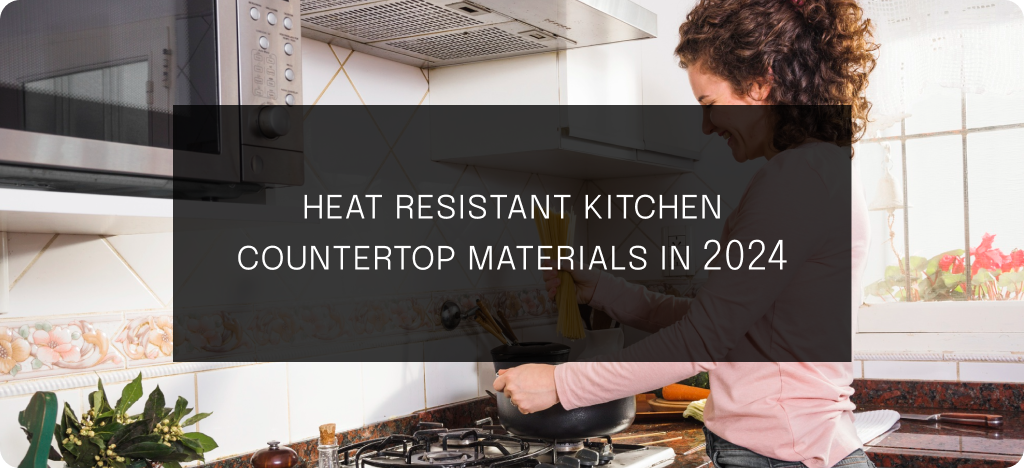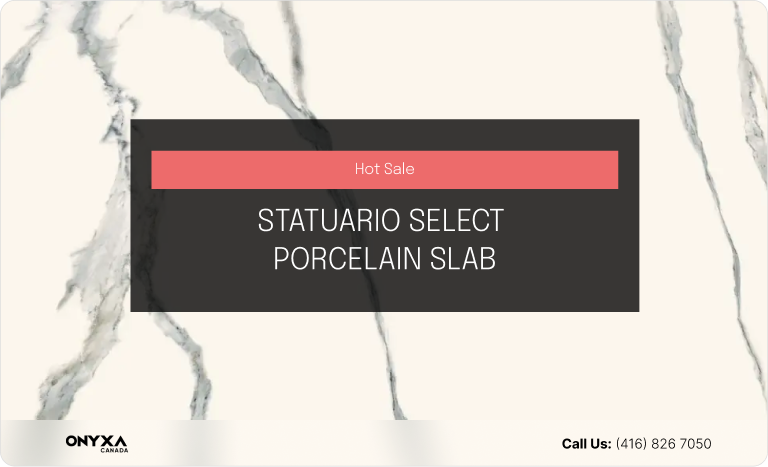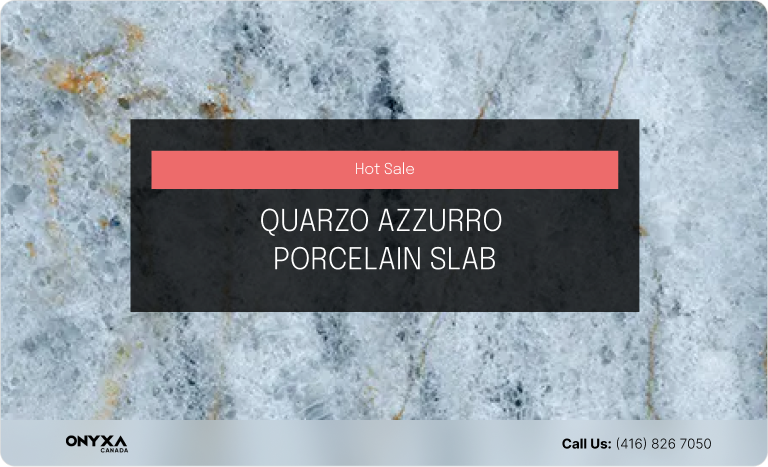Heat Resistant Kitchen Countertop Materials in 2024
Imagine cooking your favorite meal and placing hot pots and pans directly onto your countertop without worry. There are no burn marks or cracks—just a smooth, worry-free cooking experience. This is possible in 2024 with the right heat-resistant countertop materials.
Whether you love cooking or just want a kitchen that looks great and works well, this article is for you. We’ll explore the best heat-resistant countertop materials available, including the classic beauty of marble, the unique look of concrete, the reliability of quartz, and the sleek design of stainless steel. And we’ll especially highlight porcelain countertops, which are becoming a top choice for many homeowners.
Are you ready to determine the best heat resistance and style countertop material?
What are Heat-Resistant Countertops?
Heat-resistant countertops are surfaces designed to handle high temperatures without getting damaged. Imagine taking a hot pot off the stove and placing it directly on your counter without worrying about leaving a mark. That’s the magic of heat-resistant countertops!
These countertops are made from materials that can withstand the heat from hot pots, pans, and baking dishes. They keep your kitchen looking beautiful and ensure your countertop stays in great shape over time. No more stressing about burns, cracks, or discoloration.
This article will examine some of the best heat-resistant materials available in 2024. Each one offers something unique, so you can find the perfect match for your kitchen’s style and cooking needs.
Why Heat Resistance Matters in Kitchen Countertops
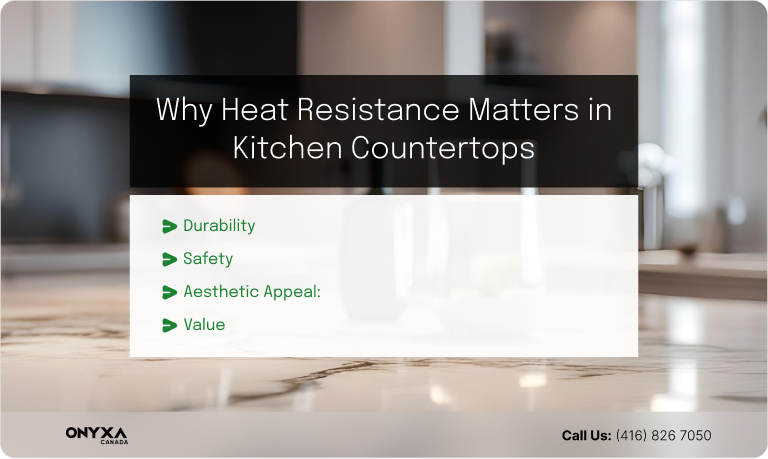
Your countertops face hot pot heat daily from hot pots, pans, and baking trays. Without proper heat resistance, your beautiful counters can quickly become marred by scorch marks, cracks, and discoloration. This affects the look of your kitchen and can lead to costly repairs or replacements.
Heat-resistant countertops provide peace of mind. You can move hot cookware directly from the stove or oven to the counter without a second thought. These materials are designed to withstand high temperatures, keeping your kitchen both functional and beautiful.
Investing in heat-resistant countertops means:
Durability: They stand up to the wear and tear of daily cooking without showing signs of damage.
Safety: Reducing the risk of burns or fire hazards from hot cookware.
Aesthetic Appeal: Maintaining their appearance over time so your kitchen always looks its best.
Value: Protecting your investment by ensuring your countertops last longer and stay in great condition.
Top Heat Resistant Kitchen Countertop Materials
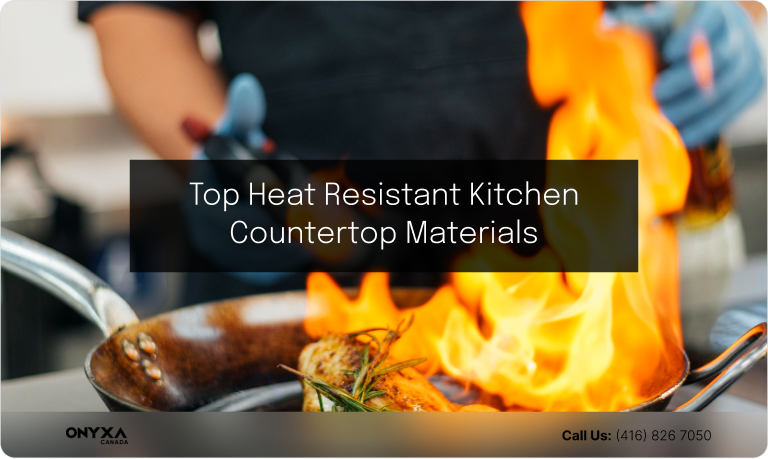
There are several outstanding options for heat-resistant kitchen countertops. Each material has unique benefits, ensuring you can find the perfect fit for your kitchen’s style and functionality. Let’s take a closer look at the top contenders:
Porcelain Countertops
Porcelain countertops are quickly becoming a favorite in modern kitchens. Made from a combination of refined clay and other natural materials, porcelain is fired at extremely high temperatures, making it incredibly durable and heat-resistant.
Advantages of Porcelain Countertops:
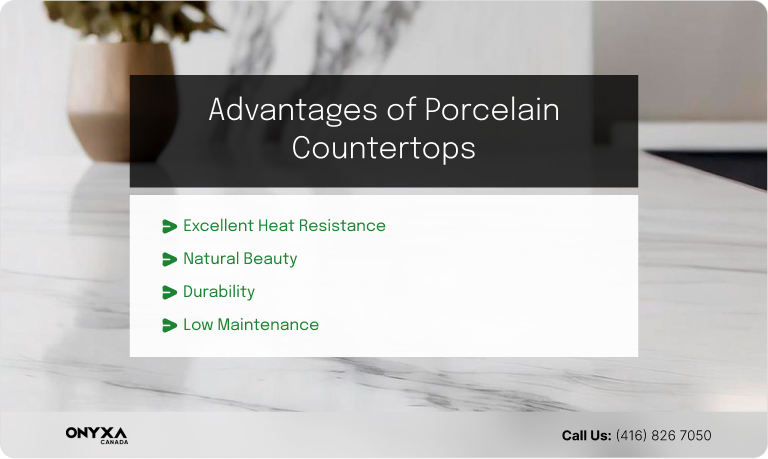
- Heat Resistance: Can withstand direct contact with hot pots and pans without damage.
- Durability: Resistant to scratches, stains, and impacts.
- Design Versatility: It is available in various colors, patterns, and finishes to match any kitchen style.
- Low Maintenance: Easy to clean with mild soap and water.
Here are some porcelain slabs that can shine your kitchen and make it heat resistant for increasing safety and durability.
You can also view the limited porcelain series with a 30% off sales offer here,
Granite Countertops
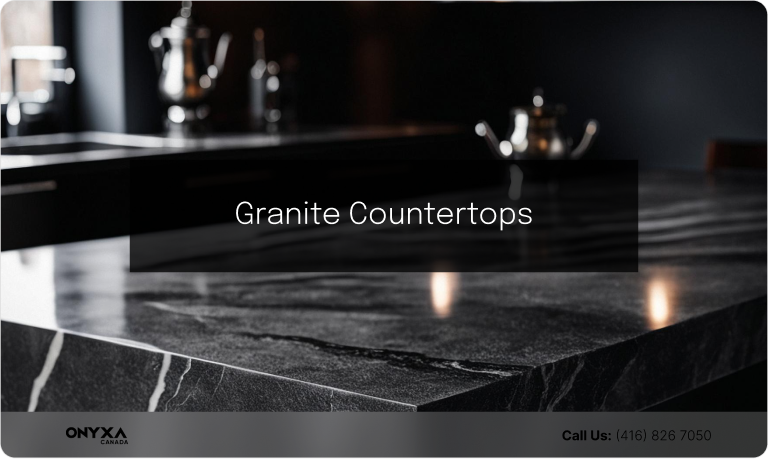
Granite has long been a favorite for kitchen countertops due to its natural beauty and heat resistance. This natural stone is formed under high pressure and heat, making it incredibly durable. Granite can handle the heat from hot pots and pans without sustaining damage, but it does require regular sealing to maintain its appearance.
Advantages of Granite Countertops:
- Heat Resistance: Excellent at withstanding high temperatures.
- Natural Beauty: Unique patterns and colors that add elegance to any kitchen.
- Durability: Strong and long-lasting with proper maintenance.
Granite countertops are available in various colors and patterns. Due to the natural variations in the stone, each slab offers a unique look.
Quartz Countertops
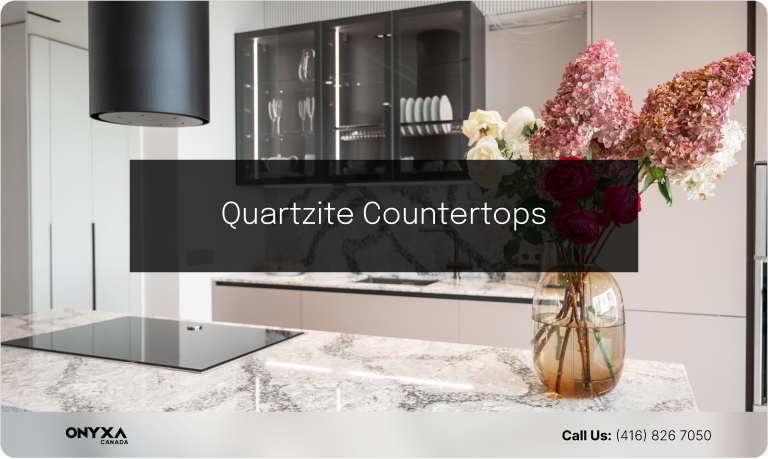
Quartz countertops are engineered from natural quartz and resin, providing good heat resistance and various design options. While quartz can handle heat, it’s best to use trivets or hot pads for extremely hot items to avoid potential damage.
Advantages of Quartz Countertops:
- Heat Resistance: Good, though caution is needed with very high temperatures.
- Non-porous: Resistant to stains and easy to clean.
- Design Variety: Available in many colors and patterns, often mimicking natural stone.
- Low Maintenance: No need for sealing, making it easy to care for.
Soapstone Countertops
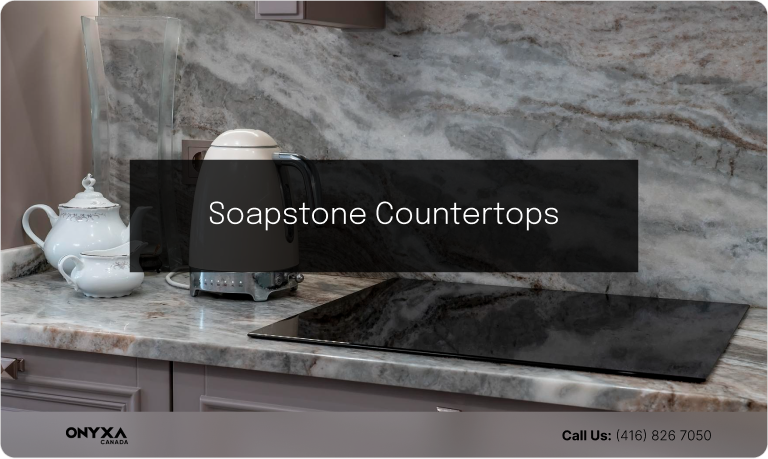
Soapstone is a natural stone that has been used for centuries in countertops due to its heat resistance and durability. It has a soft, matte finish and a smooth feel, making it a distinctive choice for kitchens.
Advantages of Soapstone Countertops:
Heat Resistance: Excellent, can handle hot pots and pans.
Durability: Resistant to stains, chemicals, and bacteria.
Unique Appearance: Develops a patina over time, giving it a unique, antique look.
Soapstone countertops are known for their dark, rich colors and unique veining patterns. They are easy to maintain and can be oiled to enhance their natural beauty and deepen their color.
Concrete Countertops
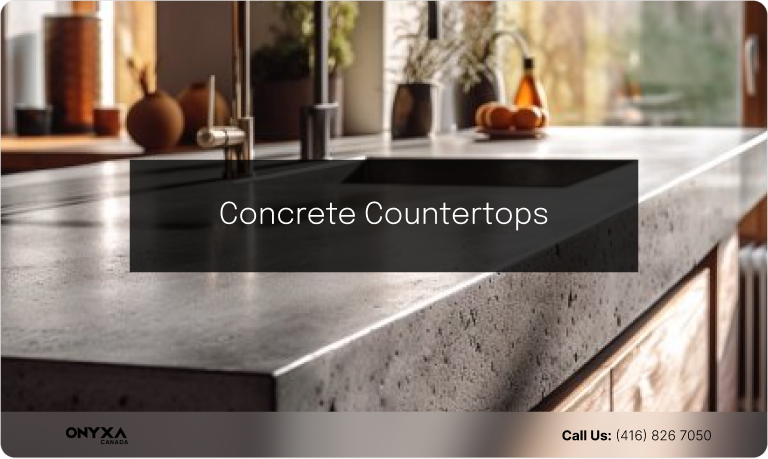
Concrete countertops are known for their unique, industrial look and versatility. They can withstand high temperatures, making them suitable for busy kitchens.
These countertops can be customized in shape, color, and texture to fit various styles. While concrete is strong and durable, it requires regular sealing to prevent stains and may develop hairline cracks over time.
Despite being heavy and needing sturdy cabinetry for support, concrete countertops offer a distinct aesthetic that can develop a charming patina with age, making them a notable choice for those seeking a unique kitchen design.
Advantages of Concrete Countertops:
Heat Resistance: Good, can withstand high temperatures.
Customization: Can be tailored to various shapes, colors, and finishes.
Durability: Strong and sturdy with proper care and maintenance.
Concrete countertops can be cast in any shape and size and can be colored, stained, or textured to create various looks. This makes them versatile for those wanting a unique, custom kitchen design.
Marble Countertops
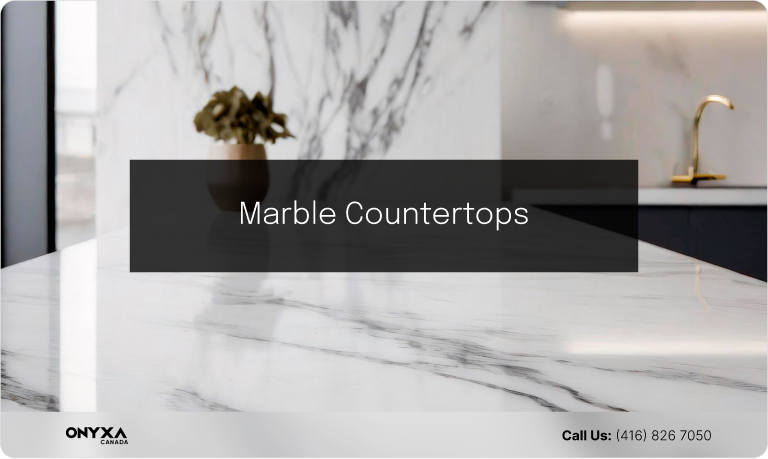
Marble countertops are renowned for their luxurious appearance and timeless beauty. While not as heat-resistant as some other materials, marble can still handle moderate heat. However, it is more susceptible to scratching and staining. Marble offers a unique, sophisticated look with elegant veining patterns that make each countertop one-of-a-kind. Its naturally cool surface is ideal for baking, but regular sealing is required to prevent stains and to etch from acidic substances. Although marble is softer than granite and quartz, proper care and maintenance can preserve its stunning appearance and functionality for years.
Advantages of Marble Countertops:
- Heat Resistance: Moderate, but care is needed to prevent damage from high heat.
- Aesthetic Appeal: Luxurious and elegant with unique veining patterns.
- Cool Surface: Naturally cool, making it ideal for baking and pastry making.
Marble countertops are often chosen for their stunning appearance and the touch of elegance they add to a kitchen. However, they require more maintenance, including regular sealing and careful cleaning, to keep them looking their best.
Comparing Porcelain with Other Heat Resistant Materials
Porcelain stands out among other heat-resistant materials for its exceptional combination of heat resistance, durability, and design versatility. Granite and stainless steel also offer excellent heat resistance but may require more maintenance or lack the design options available with porcelain. Quartz and concrete provide good heat resistance but may not be as resilient as porcelain.
Porcelain vs. Granite:
Heat Resistance: Both are excellent.
Maintenance: Porcelain requires less maintenance than granite, which needs regular sealing.
Design: Porcelain offers more design versatility.
Granite is a natural stone, providing a unique, one-of-a-kind appearance, while porcelain can mimic various materials, offering more consistent and customizable designs.
Porcelain vs. Quartz:
Heat Resistance: Porcelain is superior.
Maintenance: Both are low maintenance, but quartz can be sensitive to high heat.
Design: Both offer a wide range of design options.
Quartz offers a more uniform appearance, while porcelain provides the look of natural stone with the added benefits of higher heat resistance and durability.
Porcelain vs. Soapstone:
Heat Resistance: Both are excellent.
Durability: Porcelain is more resistant to scratches and impacts.
Aesthetics: Soapstone offers a unique, rustic look that develops a patina over time, while porcelain offers more design options.
Soapstone’s natural, antique appearance appeals to those looking for a traditional or rustic style, while porcelain offers versatility for various styles.
Porcelain vs. Concrete:
Heat Resistance: Both are good.
Maintenance: Porcelain is easier to maintain.
Customization: Concrete offers more customization, but porcelain provides a variety of ready-made designs.
Concrete is ideal for custom designs and unique finishes, while porcelain offers a broad range of styles without the need for ongoing maintenance.
Porcelain vs. Marble:
Heat Resistance: Porcelain is superior.
Durability: Porcelain is more resistant to scratches and stains.
Aesthetics: Marble offers a luxurious, classic look, while porcelain can replicate marble’s appearance with added benefits.
Marble’s natural beauty is unmatched, but porcelain offers similar aesthetics with better durability and heat resistance.
Which Countertop Material is the Most Heat-Resistant?
Porcelain emerges as one of the most heat-resistant countertop materials available. Its high-temperature firing process makes it incredibly resilient to heat, allowing it to withstand direct contact with hot pots and pans without damage. Additionally, porcelain’s durability and design versatility make it a top choice for modern kitchens.
Granite is another excellent option, known for its natural beauty and ability to handle high temperatures, though it requires regular sealing for maintenance. Stainless steel offers superb heat resistance and a sleek, industrial look, making it popular in professional kitchens despite its susceptibility to scratches and dents.
Quartz provides good heat resistance but can be sensitive to very high temperatures, necessitating the use of trivets or hot pads. Concrete is strong and customizable but needs regular sealing and can develop hairline cracks over time. While luxurious and elegant, Marble can handle only moderate heat and requires careful maintenance to avoid scratches and stains.
Among these materials, porcelain stands out for its superior heat resistance, combined with exceptional durability and a wide range of design options, making it the preferred choice for many homeowners.
Conclusion
Choosing the right heat-resistant countertop material is essential for a functional and beautiful kitchen. In 2024, several materials offer excellent heat resistance and unique benefits, ensuring you can find the perfect fit for your kitchen’s style and needs.
Porcelain countertops stand out for their exceptional heat resistance, durability, and design versatility. They can handle direct contact with hot pots and pans without damage and resist scratches, stains, and impacts. With a wide range of design options, including finishes that mimic natural stone, wood, and other materials, porcelain is a top choice for modern kitchens.
Granite countertops are another excellent option. They are known for their natural beauty and ability to withstand high temperatures. However, they require regular sealing to maintain their appearance and durability.
Quartz countertops are highly heat resistant and low-maintenance, but they can be sensitive to very high temperatures, necessitating the use of trivets or hot pads.
Concrete countertops are known for their unique, industrial look and versatility. They can withstand high temperatures but need regular sealing and may develop hairline cracks over time.
While luxurious and elegant, marble countertops handle only moderate heat and require careful maintenance to avoid scratches and stains.
Among these materials, porcelain stands out for its superior heat resistance, durability, and extensive design options, making it the preferred choice for many homeowners. Whether you prioritize functionality, aesthetics, or both, porcelain countertops offer a comprehensive solution that meets the demands of a modern kitchen.
Enhance your home with the beauty and durability of Onyxa’s porcelain slabs and natural stones. Your luxurious Toronto home is just a selection away. Let’s create something extraordinary together!
Contact us today:
+1 (416) 854-8645
FAQs
Can porcelain countertops withstand direct contact with hot pots and pans?
Absolutely! Porcelain is highly heat-resistant and can handle direct contact with hot cookware without damage.
How do I maintain porcelain countertops?
Maintenance is simple—just clean with mild soap and water. Avoid abrasive cleaners to keep the surface pristine.
Are quartz countertops as heat-resistant as porcelain?
Quartz offers good heat resistance, but porcelain is generally superior in handling high temperatures directly.
What are heat-resistant countertops?
Heat-resistant countertops are surfaces designed to withstand high temperatures without getting damaged. These materials can handle the heat from hot pots, pans, and baking dishes, keeping your kitchen looking beautiful and ensuring your countertops stay in great shape over time.
Which countertop materials are heat-resistant?
Several materials are known for their heat resistance, including porcelain, granite, quartz, soapstone, concrete, and marble. Each material offers unique benefits and design options.
How does porcelain compare to granite in terms of heat resistance?
Both porcelain and granite offer excellent heat resistance. However, porcelain requires less maintenance than granite, which needs regular sealing to maintain its appearance. Porcelain also offers more design versatility.
Is quartz a good heat-resistant countertop material?
Quartz provides good heat resistance but can be sensitive to very high temperatures. To avoid potential damage, it’s best to use trivets or hot pads for extremely hot items.
Are marble countertops heat-resistant?
Marble countertops can handle moderate heat but are more susceptible to scratching and staining than other materials. To prevent damage, it’s best to use trivets and avoid placing extremely hot items directly on marble surfaces.
Which countertop material is the most heat-resistant?
Porcelain is one of the most heat-resistant countertop materials available. Its high-temperature firing process makes it incredibly resilient to heat, allowing it to withstand direct contact with hot pots and pans without damage.
What makes porcelain countertops a top choice for kitchens?
Porcelain countertops combine superior heat resistance, durability, and design versatility. They are resistant to scratches, stains, and impacts and come in various colors, patterns, and finishes, making them suitable for any kitchen style.
How often do granite countertops need to be sealed?
Granite countertops should be sealed regularly, typically once a year, to maintain their resistance to stains and scratches and to keep them looking their best.
Do concrete countertops require a lot of maintenance?
Concrete countertops require regular sealing to prevent stains and potential hairline cracks. With proper care and maintenance, they can remain durable and attractive over time.
What are the maintenance requirements for quartz countertops?
Quartz countertops are low-maintenance and do not require sealing. However, trivets are important for extremely hot items to prevent the surface from being damaged.

